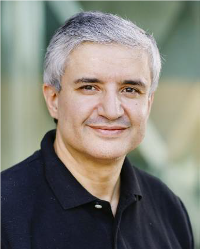Contatto di riferimento: Prof. Marco Chiani
About the speaker
Dr. Alouini was born in Tunis, Tunisia. He received the Diplome d'Ingenieur from the École Nationale Supérieure des Télécommunications (TELECOM Paris Tech) and the Diplome d'Etudes Approfondies (D.E.A.) in Electronics with Highest Honors from the Université Pierre & Marie Curie in Paris, both in 1993. He received the M.S.E.E. degree from the Georgia Institute of Technology (Georgia Tech) in 1995, and a PhD in Electrical Engineering from California Institute of Technology (Caltech) in 1998. He also received the Habilitation degree from the Université Pierre & Marie Curie, Paris, France, in 2003.
Dr. Alouini served as a faculty member in the University of Minnesota, Minneapolis, MN, USA, then in the Texas A&M University at Qatar, Education City, Doha, Qatar before joining King Abdullah University of Science and Technology (KAUST), Thuwal, Makkah Province, Saudi Arabia as a Professor of Electrical Engineering in 2009. His current research interests include design and performance analysis of diversity combining techniques, MIMO techniques, multi-hop/cooperative communications systems, optical wireless communication systems, cognitive radio systems, and multi-resolution, hierarchical and adaptive modulation schemes.
Dr. Alouini has published several papers on the above subjects and he is co-author of the textbook Digital Communication over Fading Channels published by Wiley Interscience. He has also won several awards in his career. For instance, he recently received the 2016 Recognition Award of the IEEE Communication Society Wireless Technical Committee, the 2016 Abdul Hameed Shoman Award for Arab Researchers in Engineering Sciences, and the Inaugural Organization of Islamic Cooperation (OIC) Science & Technology Achievement Award in Engineering Sciences in 2017. Other recognitions include his selection as (i) Fellow of the Institute of Electrical and Electronics Engineers (IEEE), (ii) IEEE Distinguished Lecturer for the IEEE Communication Society and IEEE Vehicular Technology Society, (iii) member for several times in the annual Thomson ISI Web of Knowledge list of Highly Cited Researchers as well as the Shanghai Ranking/Elsevier list of Most Cited Researchers, and (iv) a co-recipient of best paper awards in eleven IEEE conferences (including ICC, GLOBECOM, VTC, PIMRC, ISWCS, and DySPAN).
Abstract
Rapid increase in the use of wireless services over the last two decades has led the problem of the radio-frequency (RF) spectrum exhaustion. More specifically, due to this RF spectrum scarcity, additional RF bandwidth allocation, as utilized in the recent past, is not anymore a viable solution to fulfill the demand for more wireless applications and higher data rates. The talk goes first over the potential offered by optical wireless (OW) communication systems to relieve spectrum scarcity. It then summarizes some of the challenges that need to be surpassed before such kind of systems can be deployed. Finally, the talk offers two recent studies illustrating how supplementing OW networks with RF backup access points increases these networks reliability and coverage while maintaining their high capacity.
